Bloqueos Bloqueos
23 November 2005 (Wednesday) – Sucre, Bolivia
Gosh, the viejo señor (old man) next to me is one of those who flip and flop around the seat in his sleep and conveniently, take up more than 1/4 of your own personal space, stepping on your feet several times in the night. I put my drinking bottle between his butt and mine, so that I did not have to… er… touch him. And then, when I was really crowded off by him, I used all my strength and might to push the drinking bottle to kinda obviously hint to him that I wanted to reclaim some space back. But, this guy was like DEAD! I pushed and shoved, but he slept on merrily…
At around 2am, the bus stopped and announced a toilet break. Through the open window, I actually smelled the horrid odour of urine. I got off the bus and looked around for a toilet. There was a row of men facing the side of a wall and peeing away. What the…?? Here, we were in the middle of a small town, where obviously, many of the night buses stopped here, and obviously, night after night… and passengers were alighting and peeing right there. Poor little town!!!!
I was reeling from the stench, but I soon found a disgusting toilet in a restaurant and used it. To be honest, I think very few women used this toilet as well. Gosh, so now, I found a use for the flouncy skirts of the indigenous women. They just squatted down and peed and pooed away on the streets, while still being modestly covered up.
Upon our return to the bus, I did a little trick that Rene once taught me. Use my right index finger, circle around for a bit, and point to the object and in my mind, recite what I hope to achieve. So, I pointed to el viejo secretly and used my energy to tell him, “Stay at your seat. Give me space. Stay at your seat. Give me space.” Witchcraft, maybe? Well, it worked. For the rest of the ride, he stayed where he was.
I took a taxi to the address of my Hospitality Club host here in Sucre. Poor Wolfgang, he was still sleeping then at 6+am, but I was shown to my room kindly, and we agreed to sleep a couple of hours more and we would talk at around 9am or so.
Wow, just from a small glimpse, this is a huge, luxurious house. My room was a little annexe on its own, with a private toilet. Everything was just absolutely beautiful. The best room I had stayed in EVER, and it was free.
At around 9:30am, I had breakfast with Wolfgang, his partner Amparo and her son, Mario. Wolfgang is from Germany but he had been here since 1965, and permanently, settled down here in 1986 or something. This luxurious house is actually still being renovated. The works were first started in 2003 or 2004 and it was promised to be ready by Christmas. Well, perhaps, it would be Christmas… 3000, as Wolfgang complained disappointedly.
I really thought the house was beautiful, with mainly off-white-and-beige furnishings, quite fitting with the image of Sucre, known as La Ciudad Blanca (The White City) for its numerous houses painted in white and off-white. Truly elegant. But, to Wolfgang, who had struggled and fretted over the house fittings, electricity connections, hot or cold water for the showers, incompetent carpenters (true, the toilet door in my room would not close), drunk or missing electricians, etc… for over a year, it was a tad frustrating to think about the house.
An electrician was now fixing something in the kitchen. Amparo and Wolfgang chatted with him for a bit, before asking where he was from. “Chile,” he replied. Wolfgang was stunned. He asked in Spanish, “What is a Chilean doing here in Bolivia?” To which, the electrician replied, “What is a German doing here in Bolivia?” Hahaa… Wolfgang clarified, didn’t the electrician get ‘beaten up’ all the time over the loss of Bolivia’s access to the ocean? (Referring to the War of the Pacific where Bolivia lost the land around Antofagasta to Chile, hence, making Bolivia a landlocked country – the heart of South America.) He laughed, saying that usually the Bolivians do not remember. But occasionally, when they argue about something, they would pin the loss of the land on him. Anyway, he had been here since 1975, since the days of Pinochet, where many Chileans left as they were unable to find jobs in Chile. He’s practically a Bolivian now.
I took a stroll around Sucre, which I thought, was a really pretty colonial town. Truly, a white white city. Very clean, very ordered, nice comfy climate, lovely squares and a park with sweet-smelling flowers and a curious little structure which they claim to be a replica of the Eiffel Tower (You have to really stretch your imagination!).
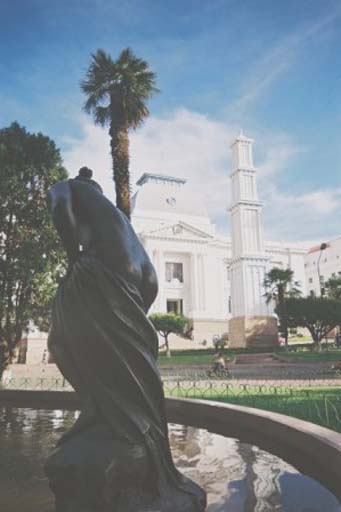
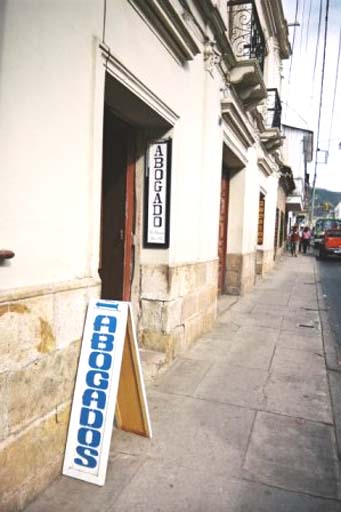
This is the legal capital of Bolivia, but in terms of importance, La Paz still ranked higher. Sucre is just used once a year (or whatever) when the new President-elect (they oust their Presidents pretty frequently) comes over to sign something.
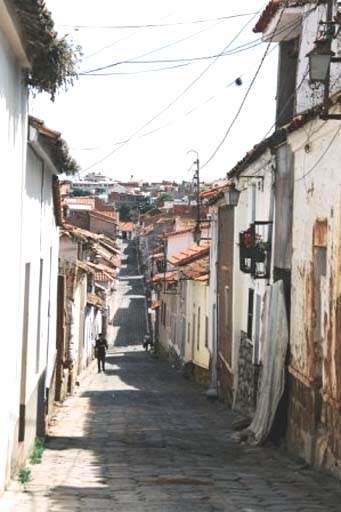
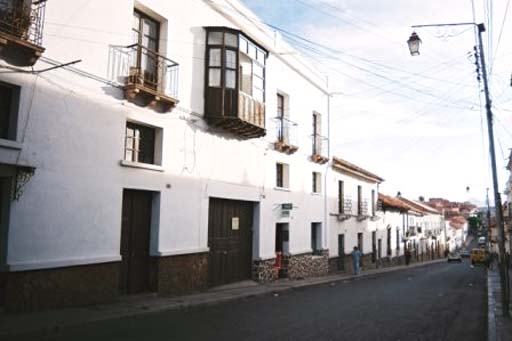
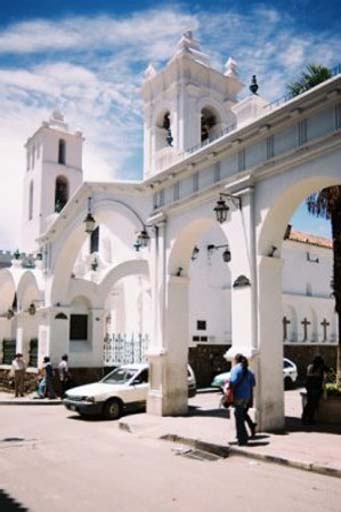
I had lunch at a chifa and knew it was not a fake chifa. Some chifas just have a Chinese face at the cash registers, rolling in the money, but the cook is local. Here, I knew at once the cook is a Chinese. I later chatted with the owner and his wife in Mandarin for more than an hour, asking them why they came all the way here from Hong Kong to Sucre to start a business.
Interestingly, they provided me another cultural aspect of South America – that of Chinese coming here in droves to open little chifas, adding little pagoda-roofs, dragon-motif windows and red lanterns all over the towns. Here, rent is cheap. And there are hardly any controls or restrictions from the government. If you can pool together the start-up money of, say, US$5000 and start the business, basically, you just have a tranquil, easy life for years to come. No one comes and bothers you.
The rent is like, US$250 a month. On some weekends, they earn that amount in 1 or 2 days. The rest of the month, they just run the business without any sense of urgency or desperation. At their age, this was a good business. He asked me how it would be like to try and start a similar business in Hong Kong or Singapore. Yeah, I know… The rent each month can be, I don’t know, US$1500 in a good location. You slog like hell to try and pay off the monthly rent, and then, you count the leftover change as your earnings. I see so many fancy restaurants come and go all over Singapore. It is impossible.
However, he sighed… he could never understand why the Bolivians here seemed to have something against earning money. Hahaa… this guy is the typical Chinese, hardworking, punctual, disciplined. When he started employing help here, the person showed up 1.5 hours late, or did not show up on certain days at all without warning. He fired one, only to find the next one worse than the first. After a while, he gave up. Now, he just counted his blessing whenever the person bothers to come to work.
On the other hand, he also exhibited the typical ‘closed’ aspect of the Chinese. In his 7 years here, he proudly told me he had never tried Bolivian food once. Never. Even if he travelled to other cities, he would look for Chinese food. Interesting…
But the bloqueos are the worst, he complained. This country is famous for them! He explained that I was very lucky to come to Bolivia now. A few months ago, there had been horrible bloqueos all over the country. Bloqueos are roadblocks, where certain groups of protesters would tumble massive rocks down the mountainous roads and cut off access to certain cities, villages for days and even weeks. This year had been terrible with bloqueos.
Sometimes, instead of such massive roadblocks, the protesters blocked off just some main streets within the town. They lined up rocks, or lay on the streets. Or, some of the students from the schools nearly, he told me, just take up an entire street and start practising their little swirly dances. As such, no one could pass by his street, affecting his business.
That night, I talked to Wolfgang more about these famed bloqueos. He himself was also pretty upset about such protests. Usually, the groups wanted the government to do something better, like increase their salaries. But, with such bloqueos, the most affected ones are once again the poorest of the poor. During such times, no produces can enter the town, thereby increasing the prices of everything. Wolfgang illustrated with this example – Say, it used to be 10 tomatoes cost 1 boliviano, but now, 1 tomato costs 1 boliviano. For Wolfgang, if he really wanted the damn tomato, he could still pay. But for the poor people? No. So, they starve.
Medical relief could not reach the hospitalised. Really sick people could not be transferred to the hospitals. Food trucks could not go forward, nor backwards. Within a few days of sitting on the road, the produces which had taken them 1 year to grow and harvest, rot in the sun. Exports to other countries were affected, plunging the economy. Factories had to close, sometimes, permanently, when they could not recuperate their losses. Campesinos, in order not to lose their jobs, had to walk 4, 5 hours through the mountains to get to the town for work. Naturally, the ones who made the most noises, are the tourists who had planes to catch. Wolfgang went on and on…
The damage these protesters did sometimes went way beyond imagination. Yet, no one had ever been arrested for these bloqueos. Wolfgang added, but sometimes, what else could these groups do to gain attention to their causes? So, the bloqueos would continue.
Tags: 09) Bolivian Rhapsody, Sucre
